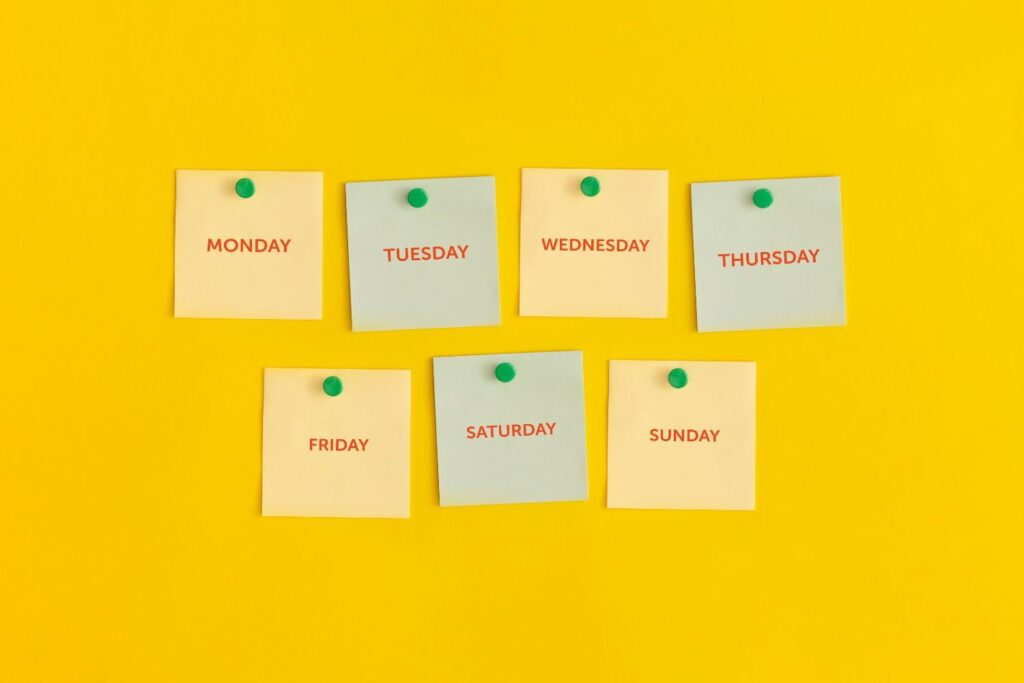The days of the week in German can be learned in a rather easy but meaningful sense towards mastering the language. Indeed, if you are planning a trip to a German-speaking country or deepening your language study, knowing how to talk about days is primarily important. Let’s break down each day, its meaning, pronunciation, and ways to remember them effectively.
The Importance of Learning German Days of the Week
Understanding and using German weekdays will help you in day-to-day conversation, planning, and approaching cultural nuances. It is an excellent way to keep in touch with the locals better, as it lets you understand how days build up the German week and work-life culture.
Overview of German Days of the Week
The German weeks have the following weekdays:
Montag – Monday
Dienstag – Tuesday
Mittwoch – Wednesday
Donnerstag – Thursday
Freitag – Friday
Samstag – Saturday
Sonntag – Sunday
Every day has its own etymology and tells much about the German language and culture.
Monday in German – Montag
What does it mean, and how do you pronounce it?
Montag is the German name for Monday. It is derived from the Germanic words “Moon Day”, just as in English.
Use Examples
- Am Montag gehe ich zur Arbeit. (On Monday, I go to work.)
- Wir sehen uns am Montag. (We’ll see each other on Monday.)
Tuesday in German – Dienstag
Meaning and Pronunciation
Dienstag (pronounced “DEENS-tag”) is German for Tuesday. The word is derived from the ancient Germanic god Tiw, as close as the English equivalent “Tuesday.”
Usage Examples
- Am Dienstag habe ich ein Meeting. (I have a meeting on Tuesday.)
- Dienstags spiele ich Fußball. (I play soccer on Tuesdays.)
Wednesday in German – Mittwoch
Meaning and Pronunciation
Mittwoch (pronounced “MITT-vohkh”) is German for Wednesday. Unlike many other days of the week, it literally means “mid-week,” pointing directly to the middle of the workweek.
Usage Examples
- Mittwochs arbeite ich von zu Hause. (I work from home on Wednesdays.)
- Wir haben am Mittwoch eine Besprechung. (We have a meeting on Wednesday.)
Thursday in German – Donnerstag
Meaning and Pronunciation
Donnerstag (pronounced “DON-ers-tag”) is Thursday. The word origins are from the god Thor, meaning “Thor’s day.”
Usage Examples
- Am Donnerstag gehe ich ins Kino. (On Thursday, I go to the cinema.)
- Donnerstags gibt es ein Angebot im Restaurant. (There’s a special offer at the restaurant on Thursdays.)
Friday in German – Freitag
Meaning and Pronunciation
Freitag, meaning FRUIT-day, is pronounced “FRY-tahg.” Friday’s name comes from Frigg, the Germanic goddess, much like the etymology of the English word “Friday.”
Usage Examples
- Freitag ist mein Lieblingstag. (Friday is my favorite day.)
- Am Freitag gehe ich mit Freunden aus. (On Friday, I go out with friends.)
Saturday in German – Samstag
Meaning and Pronunciation
Samstag (pronounced “ZAHM-stahg”) is Saturday. In southern Germany and Austria, it’s also called Sonnabend, meaning “Sun Eve.”
Usage Examples
- Samstags gehe ich einkaufen. (I go shopping on Saturdays.)
- Samstagabend gibt es eine Party. (There’s a party on Saturday evening.)
Sunday in German – Sonntag
Meaning and Pronunciation
Sonntag (pronounced “ZON-tag”) is Sunday, and it means “Sun Day,” much like in English.
Usage Examples
- Sonntag ist ein Ruhetag. (Sunday is a day of rest.)
- Am Sonntag besuche ich meine Familie. (I visit my family on Sunday.)How to Memorize the Names of Days in German
How to Remember the Days of the Week in German
Connect each day with a specific activity for memorizing. For example, if you always watch a film on one of the Thursday days of the week, try to associate Donnerstag with movie night.
Cultural Insights Related to Days in German-Speaking Countries
In German culture, Saturday and Sunday are traditional days of rest and spend with the family. Stores tend to close earlier or stay closed on Sundays, which coincides with a slower day of unwinding and bonding.
Common Expressions Involving Days of the Week in German
Here are some examples:
- Montagsblues – Monday blues
- Freitagsgefühl – Friday feeling
- Bis Montag! – See you on Monday!
Practice Exercises
- Write out each day of the week in German and English.
- Practice pronouncing each of the days.
- Use each of the days in a sentence to describe a daily routine.
Conclusion
Learning the days of the week in German is one of the key skills to begin sounding like a fluent speaker of the language. From understanding cultural nuances to planning how you are going to spend your time with locals, knowing these words is truly invaluable. So why not practice them today and begin connecting even more meaningfully with the German language and culture?

